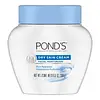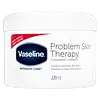What's inside
What's inside
 Key Ingredients
Key Ingredients

No key ingredients
 Benefits
Benefits

 Concerns
Concerns

 Ingredients Side-by-side
Ingredients Side-by-side

Water
Skin ConditioningParaffinum Liquidum
EmollientIsopropyl Palmitate
EmollientPetrolatum
EmollientGlycerin
HumectantStearic Acid
CleansingCeresin
Emulsion StabilisingGlyceryl Stearate
EmollientCetyl Alcohol
EmollientSorbitan Oleate
EmulsifyingEuphorbia Cerifera Cera
AstringentTriethanolamine
BufferingLaureth-23
CleansingParfum
MaskingCarbomer
Emulsion StabilisingDisodium EDTA
DMDM Hydantoin
PreservativeMethylparaben
PreservativeIodopropynyl Butylcarbamate
PreservativeWater
Skin ConditioningPetrolatum
EmollientCaprylic/Capric Triglyceride
MaskingStearic Acid
CleansingGlycerin
HumectantSodium Hydroxypropyl Starch Phosphate
AbrasiveGlycol Stearate
EmollientPEG-100 Stearate
Glyceryl Stearate
EmollientCetyl Alcohol
EmollientPhenoxyethanol
PreservativeMethylparaben
PreservativeIsopropyl Myristate
EmollientPropylparaben
PreservativeStearamide Amp
Acrylates/C10-30 Alkyl Acrylate Crosspolymer
Emulsion StabilisingDisodium EDTA
Potassium Hydroxide
BufferingCedrol
EmollientTocopheryl Acetate
AntioxidantCI 77891
Cosmetic ColorantWater, Petrolatum, Caprylic/Capric Triglyceride, Stearic Acid, Glycerin, Sodium Hydroxypropyl Starch Phosphate, Glycol Stearate, PEG-100 Stearate, Glyceryl Stearate, Cetyl Alcohol, Phenoxyethanol, Methylparaben, Isopropyl Myristate, Propylparaben, Stearamide Amp, Acrylates/C10-30 Alkyl Acrylate Crosspolymer, Disodium EDTA, Potassium Hydroxide, Cedrol, Tocopheryl Acetate, CI 77891
 Reviews
Reviews

Ingredients Explained
These ingredients are found in both products.
Ingredients higher up in an ingredient list are typically present in a larger amount.
Cetyl Alcohol is a fatty alcohol. Fatty Alcohols are most often used as an emollient or to thicken a product.
Its main roles are:
Though it has "alcohol" in the name, it is not related to denatured alcohol or ethyl alcohol.
The FDA allows products labeled "alcohol-free" to have fatty alcohols.
Learn more about Cetyl AlcoholDisodium EDTA plays a role in making products more stable by aiding other preservatives.
It is a chelating agent, meaning it neutralizes metal ions that may be found in a product.
Disodium EDTA is a salt of edetic acid and is found to be safe in cosmetic ingredients.
Learn more about Disodium EDTAGlycerin is already naturally found in your skin. It helps moisturize and protect your skin.
A study from 2016 found glycerin to be more effective as a humectant than AHAs and hyaluronic acid.
As a humectant, it helps the skin stay hydrated by pulling moisture to your skin. The low molecular weight of glycerin allows it to pull moisture into the deeper layers of your skin.
Hydrated skin improves your skin barrier; Your skin barrier helps protect against irritants and bacteria.
Glycerin has also been found to have antimicrobial and antiviral properties. Due to these properties, glycerin is often used in wound and burn treatments.
In cosmetics, glycerin is usually derived from plants such as soybean or palm. However, it can also be sourced from animals, such as tallow or animal fat.
This ingredient is organic, colorless, odorless, and non-toxic.
Glycerin is the name for this ingredient in American English. British English uses Glycerol/Glycerine.
Learn more about GlycerinGlyceryl Stearate is a mix of glycerin and stearic acid.
It is used to stabilize the mixing of water and oil ingredients. By preventing these ingredients from separating, it can help elongate shelf life. It can also help thicken the product's texture.
As an emollient, it helps soften skin and supports barrier-replenishing ingredients.
In cosmetics, Glyceryl Stearate is often made from vegetable oils or synthetically produced.
This ingredient may not be fungal-acne safe
Fun fact: The human body also creates Glyceryl Stearate naturally.
Learn more about Glyceryl StearateMethylparaben is a preservative and is a paraben. It is used to prevent the growth of fungus, mold, and other harmful bacteria. Parabens are chemicals used as preservatives in both cosmetics and food.
Methylparaben can be synthetically created. It can also be found naturally in some fruits, such as blueberries.
Oftentimes, Methylparaben is combined with other parabens to help increase the shelf life.
The safety of Methylparaben is currently being studied. While ongoing studies are looking into the safety of parabens, the results have been very mixed. Some studies have not found Methylparaben to be harmful.
Learn more about MethylparabenPetrolatum is more commonly known as petroleum jelly. It is created by mixing waxes and mineral oils.
This ingredient is effective at reducing water loss by 99%. This is because it is an occlusive. Occlusives create a hydrophobic barrier on the skin to prevent evaporation. This property makes it great for hydrating dry skin.
Pro tip: Use occlusives, such as this ingredient, on damp skin for the best results.
The quality or origin of petrolatum is only known when disclosed by the brand. Most cosmetic petrolatum has gone through several purification stages.
Another benefit of occlusives is it protects your skin against infection or allergies.
Petrolatum may not be safe for fungal-acne. Studies show mineral oil / petroleum leads to the growth of M. Furfur, a type of yeast.
Learn more about PetrolatumStearic Acid is a fatty acid. It is an emollient, emulsifier, and texture enhancer.
As an emollient, stearic acid helps soften skin. It aids the skin's protective barrier by preventing water loss. It also provides a gentle cleansing effect without stripping away natural oils.
Stearic acid may also be used to enhance the texture of products. It can add volume and stabilize ingredients such as water and oil. This can help water and oil ingredients from separating.
Sources of stearic acid include animal or vegetable fats/oils such as coconut or shea. It can be naturally found in butter, cocoa butter, shea butter, vegetable fats, and animal tallow.
This ingredient may not be Malassezia folliculitis, or fungal-acne safe.
Learn more about Stearic AcidWater. It's the most common cosmetic ingredient of all. You'll usually see it at the top of ingredient lists, meaning that it makes up the largest part of the product.
So why is it so popular? Water most often acts as a solvent - this means that it helps dissolve other ingredients into the formulation.
You'll also recognize water as that liquid we all need to stay alive. If you see this, drink a glass of water. Stay hydrated!
Learn more about Water